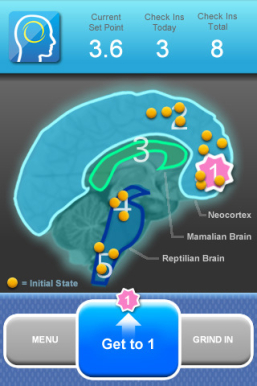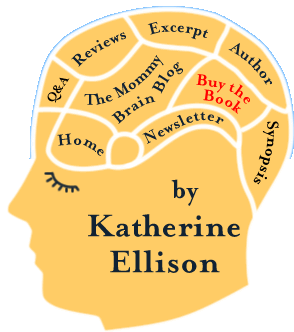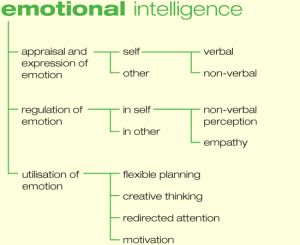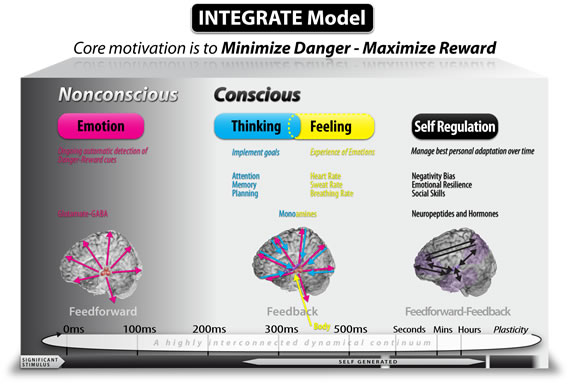Learning Self Control Early Drives Success
 Developing Your Next Brain, or making an effort to improve brain function and reach peak cognitive performance takes a lot of work. One reason we do it is to live a more successful life. While life success has many facets most agree that a cornerstone is self control. Being able to shape our own thinking and emotional responses, manage impulses, avoid self defeating assumptions and persistence in the face of obstacles is critical to living the good life. This has little to do with IQ and a lot to do with your ability to manage yourself.
Developing Your Next Brain, or making an effort to improve brain function and reach peak cognitive performance takes a lot of work. One reason we do it is to live a more successful life. While life success has many facets most agree that a cornerstone is self control. Being able to shape our own thinking and emotional responses, manage impulses, avoid self defeating assumptions and persistence in the face of obstacles is critical to living the good life. This has little to do with IQ and a lot to do with your ability to manage yourself.
There is considerable evidence to support this claim. Take for example, the recent research reported in Science News that suggests:
Good self management skills as early as age three predict health and wealth in adulthood.
The findings are dramatic:
“Low levels of conscientiousness, perseverance and other elements of self-control in youngsters as young as age 3 herald high rates of physical health problems, substance abuse, financial woes, criminal arrests and single parenthood by age 32, says an international team led by psychologists Terrie Moffitt and Avshalom Caspi of Duke University in Durham, N.C.”
How can children develop higher levels of self-control? Research from another group reported in the article claimed behavioral rewards, developing coping skills and role playing simulation using videotape are key. None of this is rocket science. For example, coping skills can include blowing bubbles and making funny faces. The rub is to learn to do these things rather than getting angry or stressed and yelling at others or giving up on a goal.
Very interested to hear from readers that have experience with specific techniques for improving self control and self management skills in children.
Categories: Child, Executive Function, Manage Emotions, Other, Training Tags: EQ, experiential learning
Need a Brain Boost? Crank Your Favorite Tunes
 Music stimulates our brains and can support peak cognitive performance in many ways. A new study at McGill University has revealed part of the reason – pleasurable music releases dopamine, a powerful neurotransmitter that the brain uses as a reward. The researchers also found that the stronger the emotional reaction to the music the more dopamine that is released. Some details:
Music stimulates our brains and can support peak cognitive performance in many ways. A new study at McGill University has revealed part of the reason – pleasurable music releases dopamine, a powerful neurotransmitter that the brain uses as a reward. The researchers also found that the stronger the emotional reaction to the music the more dopamine that is released. Some details:
The team at The Neuro measured dopamine release in response to music that elicited “chills”, changes in skin conductance, heart rate, breathing, and temperature that were correlated with pleasurability ratings of the music. ‘Chills’ or ‘musical frisson’ is a well established marker of peak emotional responses to music. A novel combination of PET and fMRI brain imaging techniques, revealed that dopamine release is greater for pleasurable versus neutral music, and that levels of release are correlated with the extent of emotional arousal and pleasurability ratings.
You can listen to the music they used in the study here.
Pleasurable music is a powerful and natural source of mental energy. Need a brain boost? Turn to your iPod.
Interested to hear from readers that use music in their brain training or physical workout routines.
Categories: Mental Focus, Music and Audio Tags: EQ
Does Emotional Intelligence Peak in Your 60s?
 Emotional intelligence is our ability to spot, manage and generate emotions in ourselves and others. It appears to correlate better to life success than IQ. Emotional intelligence is not taught in school, it is learned (by some) through life experience. So it should be no surprise that it should improve as we age.
Emotional intelligence is our ability to spot, manage and generate emotions in ourselves and others. It appears to correlate better to life success than IQ. Emotional intelligence is not taught in school, it is learned (by some) through life experience. So it should be no surprise that it should improve as we age.
According to recent research from the University of California at Berkley, some aspects of emotional intelligence appear to peak in our 60s. These include:
- Effective use of positive reappraisal (seeing the bright side of things) to reinterpret negative situations in a positive way.
- Sensitivity to sadness or the ability to empathize with those feeling sad.
These are important findings as they help to further dispel the myth of universal cognitive decline with age. Understanding which aspects of cognitive performance naturally improve as we age should shape our approach to brain fitness.
Interested to hear from readers that have noticed improvements in Emotional Intelligence in older adults.
Categories: IQ and EQ, Lifestyle, Manage Emotions, Older Adult Tags: emotion, EQ
Training for a High-Performing Emotional Brain
 Emotions play a key and often dominate role in our brain function and cognitive performance. We create emotions anytime we appraise or make judgments on people, events, ideas or other things. Our ability to spot, understand and manage emotions in ourselves and others correlates more strongly to life success than IQ. So-called emotional intelligence is a cornerstone for high performance learning, decision-making, creativity, collaboration and other mental and social processes. So I am also on the lookout for new science-based techniques for training my emotional brain.
Emotions play a key and often dominate role in our brain function and cognitive performance. We create emotions anytime we appraise or make judgments on people, events, ideas or other things. Our ability to spot, understand and manage emotions in ourselves and others correlates more strongly to life success than IQ. So-called emotional intelligence is a cornerstone for high performance learning, decision-making, creativity, collaboration and other mental and social processes. So I am also on the lookout for new science-based techniques for training my emotional brain.
For example, take the work on Emotional Brain Training or EBT. It provides a simple way to assess which of five core brain states you are in and then suggests a tool for achieving self-regulation . The five brain states and associated tools are related to your level of stress and include:
- Balanced/reward (joy) state use the Sanctuary tool
- Balanced state use the Feelings check tool
- Verge of stress (mixed) state use the Emotional Housecleaning tool
- Stressed (unbalanced) state use the Cycle tool
- Full blown stress (underwhelmed) state use the Damage control tool
To get started right away you can download the Emotional Brain Training iPhone app (shown above) or find the equivalent in the Droid market.
 If you want to understand more of the theory behind how it works check out the new book, Wired for Joy. Or consider some of the training and coaching offerings from the Institute for Health Solutions.
If you want to understand more of the theory behind how it works check out the new book, Wired for Joy. Or consider some of the training and coaching offerings from the Institute for Health Solutions.
I am just learning to use EBT and am interested to hear from readers that have some experience with one or more of the five tools.
Categories: IQ and EQ, Lifestyle, Manage Emotions, Software, Training Tags: emotion, EQ, smart phone
Integrated Brain Training Over the Web
MyBrainSolutions offers a software-based brain training program over the web. There are also some apps for your smart phone. You can sign up for the basic membership for free or pay $9.95/month for the premium service. With the premium service you complete a brain assessment and get training recommendations based on your specific needs. You also get access to more training exercises. The basic membership gives you four. With both memberships you get a personal dashboard (web page) that provides access to your tools and results.
The program appears unique in its emphasis on emotions, thinking, feelings and self-regulation and how they work together in an integrated way. You can watch a five minute video on the site that explains it. The emphasis on automatic processing of emotional queues (mainly facial expressions) and how that shapes our intuitions and decision-making, is right on. I have not seen any other brain training program tackle that.
I am using the basic membership and like what I see. Interested to hear from readers that have purchased the premium membership. Is it worth $10 per month? Thanks.
Categories: Executive Function, Manage Emotions, Memory and Learning, Software Tags: brain training, EQ, smart phone
Boost Happiness by 25% with Simple Gratitudes
 By consciously cultivating a sense of gratitude you can improve happiness by 25%. While this does not raise your IQ it definitely raises you emotional quotient or EQ by developing skills in recognizing and managing emotions.
By consciously cultivating a sense of gratitude you can improve happiness by 25%. While this does not raise your IQ it definitely raises you emotional quotient or EQ by developing skills in recognizing and managing emotions.
But how do you cultivate gratitude? For some excellent practical tips check out Enhance Happiness and Health by Cultivating Gratitude: Interview with Robert Emmons. Some examples:
“The most common method we use in our research is to ask people to keep a “Gratitude Journal” where you write something you feel grateful for. Doing so 4 times a week, for as little as 3 weeks, is often enough to create a meaningful difference in one’s level of happiness. Another exercise is to write a “Gratitude Letter” to a person who has exerted a positive influence on one’s life but whom we have not properly thanked in the past, and then to meet that person and read the letter to them face to face.”
I am interested to hear from readers that use specific techniques for building EQ through practicing gratitudes.
Categories: IQ and EQ, Lifestyle, Manage Emotions Tags: EQ, experiential learning, smart phone
Does Raising a Child Make You Smarter?
 Absolutely, if you are the Mother! At least that is the argument made Katherine Ellison in her book the Mommy Brain: How Motherhood Makes Us Smarter.
Absolutely, if you are the Mother! At least that is the argument made Katherine Ellison in her book the Mommy Brain: How Motherhood Makes Us Smarter.
Motherhood gives a brain boost in many ways including face reading, multi-tasking, fearlessness, serenity, empathy, assertiveness and mental dexterity. These improvements in both IQ and EQ come from a combination of new hormones, motivation and practice that motherhood brings about.
The book is well founded in the latest neuroscience. It upends the stereotype of mothers checking their brains at the delivery room doors. Check out the Mommy Brain site by clicking on the graphic to the right.
Categories: Books, IQ and EQ, Lifestyle, Manage Emotions, Mental Focus, Parent, Perception Tags: embodied cognition, EQ
Is Your Next Brain in Fact Your Heart?
 Daniel Goleman popularized the notion of Emotional Intelligence in 1995 in his best selling book by the same name. The idea is that a lot of what counts as smarts comes from our ability to perceive and manage emotions in ourselves and others. This is the foundation for self control and healthy relationships and leads to a successful life. The focus on emotional thinking versus rational or logical thinking as a key to intelligence was a huge paradigm shift that is still unfolding today.
Daniel Goleman popularized the notion of Emotional Intelligence in 1995 in his best selling book by the same name. The idea is that a lot of what counts as smarts comes from our ability to perceive and manage emotions in ourselves and others. This is the foundation for self control and healthy relationships and leads to a successful life. The focus on emotional thinking versus rational or logical thinking as a key to intelligence was a huge paradigm shift that is still unfolding today.
There is no doubt that understanding and manging emotions is a key for improving learning, decision-making, creativity, collaboration and other cognitive skills. Emotional intelligence will be a frequent topic on the Next Brain Blog. In an earlier post I provided links to quick and in-depth surveys that let you measure your emotional quotient (EQ) or level of emotional intelligence. In this post we will start to examine techniques for improving it.
For a quick introduction to how to develop your EQ check out the HELPGUIDE’s post on Five Key Skills for Building Emotional Intelligence. Although there are literally thousands of websites, books and other resources for learning about EQ I like this site. It demonstrates that emotional intelligence is rooted in common-sense life skills such as quickly reducing stress and managing your own feelings. No rocket science but the fact is that we often don’t take the time to develop specific skills to do these kinds of things and that impedes our cognitive performance.
Check the site out and please comment on the specific techniques you use to develop EQ.
Source: Emotional Intelligence Image
Measure Your EQ & Build Emotional Intelligence
Over the last two decades we have done the science to know that being smart about emotions is the key to life success. A common sense conclusion for many but with the science we now have the tools for systematically getting better at it.
 Some argued that your emotional quotient (EQ) is more important than your intelligence quotient (IQ) when it come to achieving success. Emotional smarts over book smarts. This is true because emotions play a critical role in learning, problem solving, decision making, creativity, collaborating and many other brain-heavy activities. So it should be no surprise that being smart about emotions – being able to spot them, harness them to positive outcomes and even generate them on demand – is a cornerstone for success.
Some argued that your emotional quotient (EQ) is more important than your intelligence quotient (IQ) when it come to achieving success. Emotional smarts over book smarts. This is true because emotions play a critical role in learning, problem solving, decision making, creativity, collaborating and many other brain-heavy activities. So it should be no surprise that being smart about emotions – being able to spot them, harness them to positive outcomes and even generate them on demand – is a cornerstone for success.
Focusing on EQ and strengthening emotional intelligence is key to developing YourNextBrain! It will be a frequent topic on this blog. To get started check out the post from Psychology Today on Emotional Intelligence. They provide a crisp definition:
“Emotional intelligence is the ability to identify and manage your own emotions and the emotions of others. It is generally said to include three skills:
 emotional awareness, including the ability to identify your own emotions and those of others;
emotional awareness, including the ability to identify your own emotions and those of others;- the ability to harness emotions and apply them to tasks like thinking and problems solving;
- the ability to manage emotions, including the ability to regulate your own emotions, and the ability to cheer up or calm down another person.”
As well as links to many great overview articles.
If you are considering building up your emotional intelligence I suggest you start by measuring it:
- Quick Measure (17 questions and 10 minutes)
- In Depth Measure (106 questions and 30 minutes)
Please share what you learn about your EQ and experiences you have had in improving it.
Categories: IQ and EQ, Manage Emotions Tags: emotion, EQ

